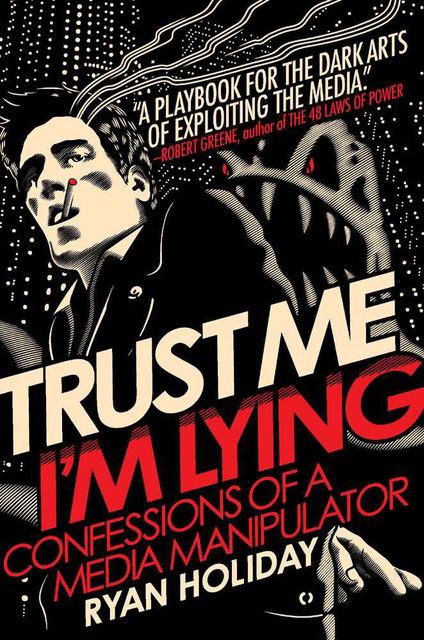Trust Me, I'm Lying: Confessions of a Media Manipulator
Este libro no está disponible por el momento.
328 páginas impresas
Opiniones
- Abu Alizadacompartió su opiniónhace 5 años👍Me gustó
- Soliloquios Literarioscompartió su opiniónhace 5 años👍Me gustó💡He aprendido mucho
Citas
- Nikolai C.compartió una citahace 5 añosecause once you understand the limitations of the platform, the constraints can be used against the people who depend on it.
- Adrickcompartió una citahace 5 añosWhen you see “We’ve reached out to So-and-So for comment” know that they sent an e-mail two minutes before hitting “publish” at 4:00 A.M., long after they’d written the story and closed their mind, making absolutely no effort to get to the truth before passing it off to you as the news.
When you see an attributed quote or a “said So-and-So” know that the blogger didn’t actually talk to that person but probably just stole the quote from somewhere else, and per the rules of the link economy, they can claim it as their own so long as there is a tiny link to the original buried in the post somewhere.
When you see “which means” or “meaning that” or “will result in” or any other kind of interpretation or analysis know that the blogger who did it likely has absolutely zero training or expertise in the field they are opining about. Nor did they have the time or motivation to learn. Nor do they mind being wildly, wildly off the mark, because there aren’t any consequences.
When you hear a friend say in conversation “I was reading that …” know that today the sad fact is that they probably just glanced at something on a blog. - Adrickcompartió una citahace 5 añosWhen you see “We’re hearing reports” know that reports could mean anything from random mentions on Twitter to message board posts, or worse.
When you see “leaked” or “official documents” know that the leak really meant someone just e-mailed a blogger, and that the documents are almost certainly not official and are usually fake or fabricated for the purpose of making desired information public.
When you see “BREAKING” or “We’ll have more details as the story develops” know that what you’re reading reached you too soon. There was no wait and see, no attempt at confirmation, no internal debate over whether the importance of the story necessitated abandoning caution. The protocol is going to press early, publishing before the basics facts are confirmed, and not caring whether it causes problem for people.
When you see “Updated” on a story or article know that no one actually bothered to rework the story in light of the new facts—they just copied and pasted some shit at the bottom of the article.
When you see “Sources tell us …” know that these sources are not vetted, they are rarely corroborated, and they are desperate for attention.
When you see a story tagged with “EXCLUSIVE” know that it means the blog and the source worked out an arrangement that included favorable coverage. Know that in many cases the source gave this exclusive to multiple sites at the same time or that the site is just taking ownership of a story they stole from a lesser-known site.
When you see “said in a press release” know that it probably wasn’t even actually a release the company paid to officially put out over the wire. They just spammed a bunch of blogs and journalists via e-mail.
When you see “According to a report by” know that the writer summarizing this report from another outlet has but the basest abilities in reading comprehension, little time to spend doing it, and every incentive to simplify and exaggerate.
fb2epub
Arrastra y suelta tus archivos
(no más de 5 por vez)


